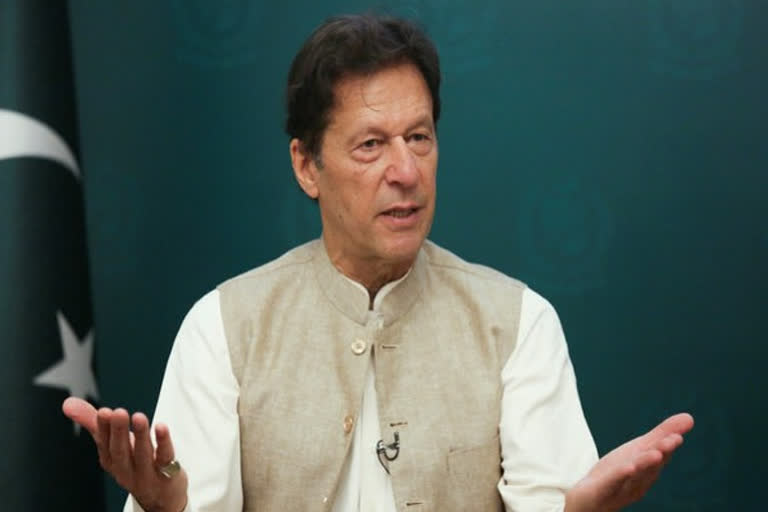Hyderabad: Pakistan Prime Minister Imran Khan may well like the world to recognise the Taliban regime in Afghanistan and strengthen it but the fact of the matter is that he will find it hard to convince his own neighbourhood.
Addressing the UN General Assembly session Friday, Khan said that the international community needs to try and strengthen the new Taliban government in Afghanistan, instead of isolating it.
"What have the Taliban promised? They will respect human rights. They will have an inclusive government. They will not allow the soil to be used by terrorists. And they have given amnesty. Now, if the world community incentivizes them, encourages them to walk this talk, it will be a win-win situation for everyone," he said.
But countries in South Asia itself are not aligned to Pakistan's views on the Taliban regime. The proof of this is the cancellation of a meeting of the South Asian Association for Regional Association(SAARC) regional bloc that was scheduled to be held Saturday on the sidelines of the ongoing UN General Assembly session.
Also read: SAARC bulldozes Pakistan's proposal for Taliban at regional meet
Pakistan insisted that no official of the previous Ashraf Ghani regime be allowed to represent Afghanistan in the SAARC council of ministers meeting. However, other members of the eight-nation bloc agreed to keep an empty chair as a symbolic representation of that country.
But then again, Islamabad insisted that the Taliban dispensation should be allowed to send a representative to the meeting. The other members of SAARC then put their foot down and Nepal, as the host, cancelled the meeting.
SAARC was founded in December 1985 in Dhaka, Bangladesh, a seven-nation grouping with Bangladesh, Bhutan, India, the Maldives, Nepal, Pakistan and Sri Lanka as members. Afghanistan is the youngest member having joined the bloc in 2007 when Hamid Karzai was the President. As of 2019, the SAARC countries comprised 3 percent of the world's area, 21 percent of the world's population and 4.21 percent of the global economy.
As such, Saturday's meeting in New York would have been significant for the region particularly because of the developments in Afghanistan. However, Pakistan's rigid stand on the Taliban regime led to its cancellation. Had a Taliban representative been allowed to attend the meeting, it would have given legitimacy to the fundamentalist outfit.
In his speech at the Shanghai Cooperation Organisation summit earlier this month, Prime Minister Narendra Modi described the Taliban regime as non-inclusive as it has come without any negotiation.
“This raises questions about the acceptability of the new system,” Modi said. “The representation of all sections of Afghan society, including women and minorities, is also important. And therefore, it is necessary that the decision on recognition of such a new system is taken by the global community collectively and after due thought.”
Also read: India, US issue joint statement asking Taliban to abide by UNSC guidelines
A joint statement statement issued following the bilateral summit between Modi and US President Joe Biden in Washington Friday also stated that both sides resolved that the Taliban must abide by UN Security Council Resolution 2593 (adopted August 30,2021), which demands that Afghan territory must never again be used to threaten or attack any country or to shelter or train terrorists, or to plan or finance terrorist attacks, and underscored the importance of combating terrorism in Afghanistan.
“The leaders called on the Taliban to adhere to these and all other commitments, including regarding the safe, secure, and orderly departure from Afghanistan of Afghans and all foreign nationals and to respect the human rights of all Afghans, including women, children, and members of minority groups,” it stated. “They emphasised the importance of efforts to provide humanitarian assistance to Afghanistan, called on the Taliban to allow full, safe, direct and unhindered access for the United Nations, its specialised agencies and implementing partners, and all humanitarian actors engaged in humanitarian relief activity, including with respect to internally displaced persons.”
The other SAARC nations also hold similar views. Bangladesh has not taken any concrete decision on recognising the Taliban government and is following a wait and watch policy. Sri Lanka too is apprehensive of terror threats emanating from Afghanistan with former Prime Minister Ranil Wickremesinghe asking the government to refrain from recognising the Taliban. The Maldives has not taken any decision on Taliban governance in Afghanistan, a government official told a news outlet without going into details.
When the Taliban was in power from 1996 to 2001, Pakistan was one of three nations to recognise it, the other two being Saudi Arabia and the United Arab Emirates. This time though, after the Taliban formed a caretaker government September 4, Islamabad is yet to formally recognise and seems to be watching what its friendly countries do.
Prime Minister Imran Khan might well be cajoling the world to recognise the Taliban regime in Afghanistan, but his words have no takers in South Asia itself.


